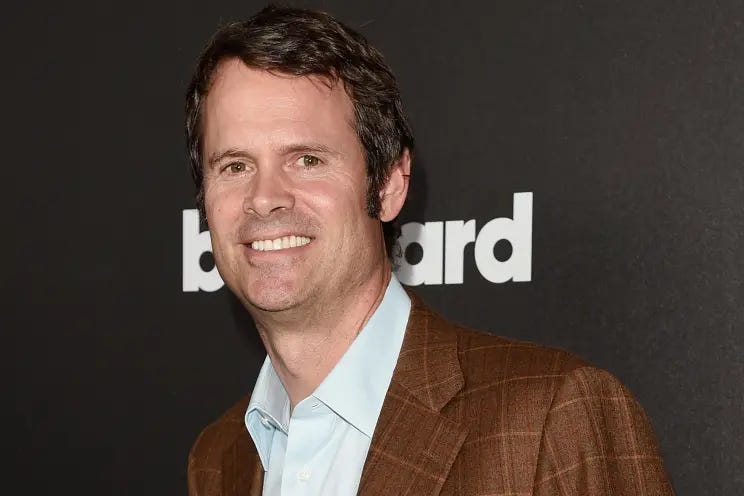The Man Who Got Rejected Hundreds of Times and Changed Music Forever
How Tim Westergren's "impossible" idea survived two years of brutal NOs to become Pandora
Tim Westergren had just walked out of another disastrous pitch meeting. He'd lost count somewhere after rejection 200, but this felt like one of the worst yet. His shirt was still damp with nervous sweat, his PowerPoint deck felt like dead weight in his laptop bag, and his checking account balance was approaching zero.
Most entrepreneurs would've called it quits right there. Hell, most would've thrown in the towel 100 rejections ago. But Westergren had something that bordered on delusion: absolute faith in an idea everyone thought was bonkers.
The "Impossible" Dream
The year was 2000, and Westergren was obsessed with something he called the Music Genome Project (basically, a way to "fingerprint" every song by breaking it down into hundreds of musical elements like rhythm, melody, vocal style, and instrument types so computers could understand what makes songs similar beyond just genre labels). While everyone else was thinking about file-sharing and digital downloads, he wanted to crack the actual code of music itself.
His plan? Hire real musicians to analyze every song ever recorded. Not just "this is rock" or "this is pop" but deep analysis. Is the vocal delivery smooth or rough? Are the guitar solos intricate or simple? Does the song have a strong backbeat? What about the harmonic complexity?
He wanted to map 400 different musical attributes for every single song. Then use that data to predict what music people would love based on what they already liked.
The VCs stared at him like he'd suggested colonizing Mars with a paper airplane. "This is insane," they said. "Too expensive. Too complicated. Why not just use collaborative filtering like everyone else see what similar users like and recommend that?"
The Survival Mode Years
What happened next was a masterclass in entrepreneurial masochism. For two years, Westergren lived in a cycle of pitch, rejection, repeat. His co-founders worked without salaries, maxing out credit cards and borrowing money from friends just to keep the lights on.
The office became a testament to stubborn hope. Employees would joke about whose credit card would work that week for pizza. Westergren himself went 18 months without a paycheck, surviving on the kindness of friends and an almost supernatural belief that he was onto something revolutionary.
Meanwhile, every VC in Silicon Valley was telling him the same thing: "Music recommendation doesn't need to be this complicated. Just track what users listen to and suggest similar stuff."
But Westergren knew they were missing the point. Music isn't just data it's emotion, texture, feeling. You can't capture that with simple user behavior tracking.
The Breakthrough Moment
Then came the meeting that changed everything with Larry Marcus at Walden Venture Capital. Something was different this time. Marcus didn't glaze over when Westergren explained the 400 musical attributes. He didn't roll his eyes at the army of musicians needed to analyze songs.
Instead, Marcus leaned forward and asked deeper questions. After several follow-up meetings and due diligence, Walden led a funding round that gave Pandora the lifeline it desperately needed.
Suddenly, the "impossible" Music Genome Project had backing from investors who actually understood the vision.
The Pandora Effect
By 2005, Pandora launched with something magical: radio stations that actually understood music. Type in Any music and you'd get not Genre but music with similar harmonic complexity, instrumental improvisation, and rhythmic feel.
It wasn't just recommendation it was musical education. Pandora introduced people to artists they'd never heard of but instantly loved. The platform grew to over 250 million users, proving that Westergren's "overly complex" approach was exactly what music discovery needed.
The Real Kicker
Here's what makes this story incredible: Westergren was pitching a solution to a problem most people didn't even know they had. In 2000, music recommendation meant asking friends or listening to radio DJs. The idea that a computer could understand the emotional texture of music seemed like science fiction.
Today, every streaming service uses some version of musical analysis. Modern platforms consider audio features, analyze musical DNA, and understand rhythm and energy levels. Westergren wasn't just building a product he was defining an entire industry.
Why This Matters Today
Westergren's story isn't just startup lore it's a blueprint for building something that matters. He didn't pivot when times get tough. He didn't water down his vision to make it more "fundable." He stuck to his guns when everyone thought he was nuts.
The hundreds of rejections weren't failures they were steppingstones. Each "no" refined his pitch, strengthened his resolve, and brought him closer to finding someone who shared his vision.
Today, when we casually discover new music through algorithmic recommendations, we're using technology that one man refused to let die, even when the entire venture capital community thought it was doomed.
Maybe you're sitting on an idea that feels too ambitious, too complex, or too ahead of its time. Maybe you've heard a few NOs and you're wondering if you should simplify your vision or find something easier to sell.
Westergren's story suggests a different path: What if the thing that makes your idea "too complex" is exactly what makes it revolutionary?
The next time someone tells you your idea is impossible, remember the guy who got rejected hundreds of times and changed how the world discovers music. Sometimes impossible is just another word for inevitable you just have to wait for the world to catch up.






